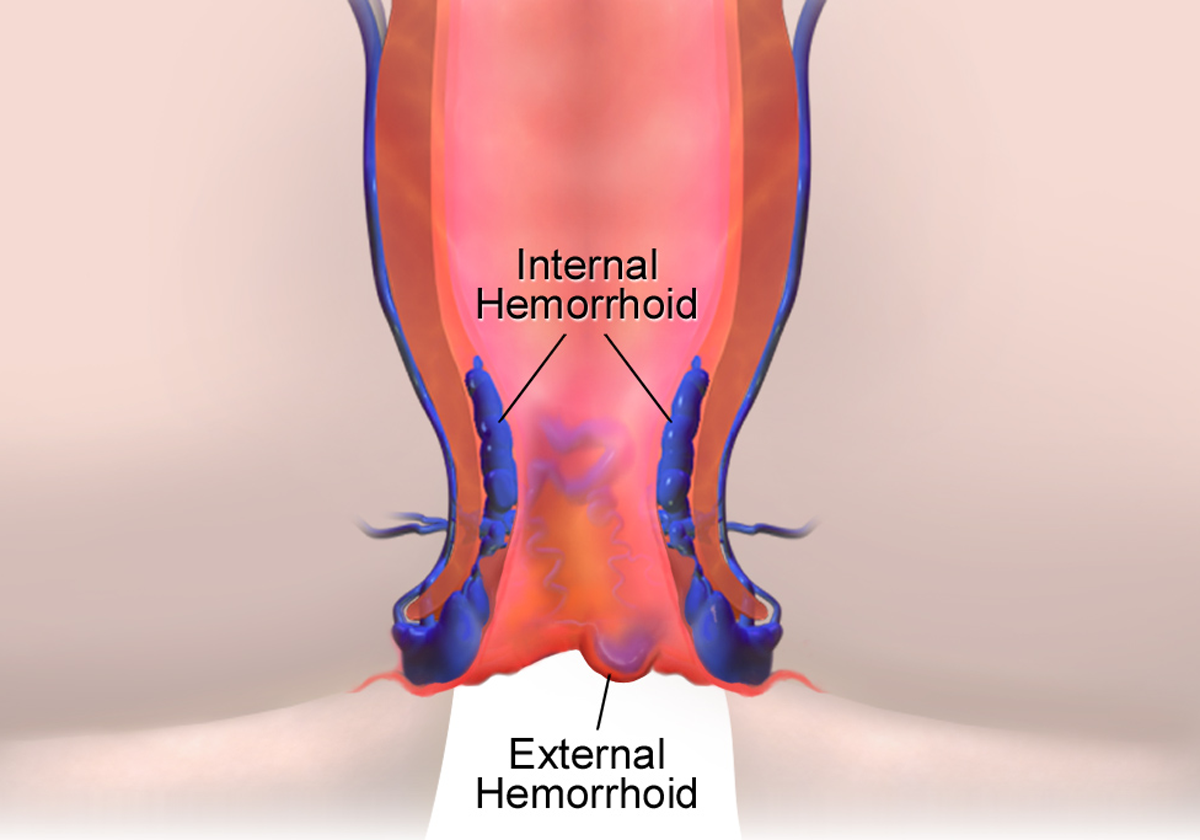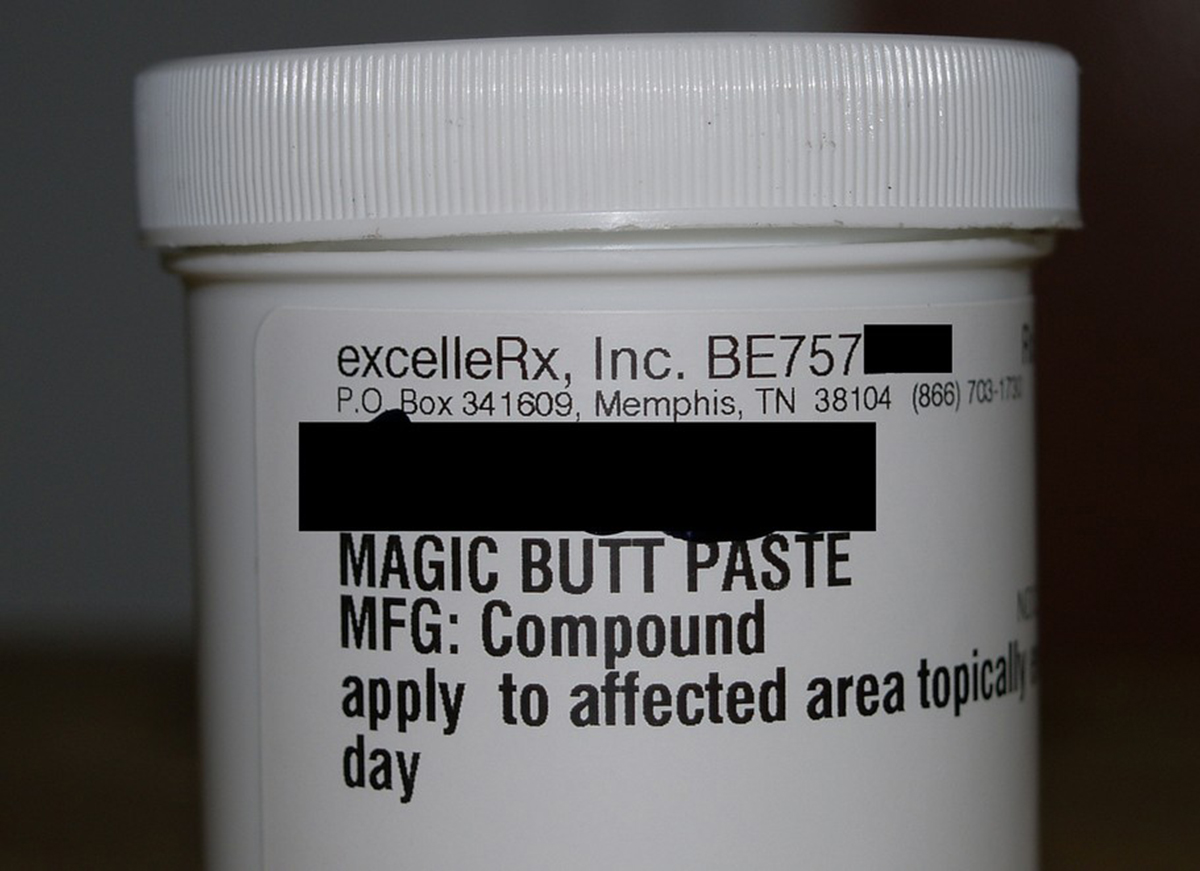Hemorrhoids — that is inflamed, swollen veins in and around the anus and the rectum — are probably the very definition of "a pain in the butt". They can occur both externally and internally, and internal hemorrhoids may prolapse through the anus.

You might not like the idea of taking a closer look at hemorrhoids, but that's exactly what we'll do in this article by examining their symptoms and causes, as well looking at treatment options for hemorrhoids and some preventative measures that can help you avoid ever suffering from this particular pain in the behind.
Hemorrhoids: Causes And Prevalence
Hemorrhoids are horrendously common. They develop when veins in the rectum are inflamed, swell, and stretch. Seventy-five percent of people will experience hemorrhoids at least once in their lifetime, and they are most likely to show up in those people who are aged between 45 and 65 and pregnant or postpartum women.
Anal and rectal veins may swell for a number of reasons, including a diet too low in fiber, straining on the toilet, chronic constipation and/or diarrhea, and sitting on the toilet for too long. All of these causes have something in common: they increase the pressure on the pelvic veins. This same pressure also weakens connective tissues in the anal canal, potentially leading to bulging veins — hemorrhoids.
Connective tissues in the anus and rectum naturally weaken with age, which is why hemorrhoids are more likely to show up in older people. Hemorrhoids during pregnancy are caused by the inevitable increased abdominal pressure, but the good news is that pregnancy-related hemorrhoids will usually disappear by themselves following childbirth and recovery.
Symptoms You Can Expect If You Have Hemorrhoids
External hemorrhoids can give themselves away by forming hard, uncomfortable lumps around the rectum — pointing to so-called thrombosed hemorrhoids. They can also cause rectal pain and blood on your toilet paper or within the stool. Believe it or not, many external hemorrhoids don't have any clear symptoms and they may be gone before you even know you had them.
Internal hemorrhoids often lead to bright red blood in stools or on toilet paper after wiping. You may also experience itching and in rare cases pain. If an internal hemorrhoid prolapses, it will bulge from the anus and make itself rather noticeable. You may also feel the urge to have a bowel movement after meeting your toilet needs, due to the presence of a large internal hemorrhoid that causes pressure.
It is important to keep in mind that hemorrhoids so frequently disappear on their own that many patients never experience any symptoms. Though symptoms can quickly clear up if they do appear, anyone with symptoms that could point to hemorrhoids should be aware of the fact that you could also be dealing with other medical conditions. Colon cancer leads to rectal bleeding and pain too, to name one example, and it is always wise to notify your health care provider about the changes you have noticed.
See Also: Hemorrhoids: Best Methods To Cure Hemorrhoids
Diagnosing Hemorrhoids: What Can You Expect?
A physical examination will be the first step in the diagnostic process, right after you tell your doctor why you came to see them and describe your symptoms. A visual inspection shows external hemorrhoids, while a rectal exam with an anoscope can reveal internal hemorrhoids within the rectum. A colonoscopy, in which a flexible tube called a colonoscope is inserted through the anus, is an exam that has the capacity to show the inside of the rectum and colon. A sigmoidoscope (shorter than the colonoscope) may also be used, and X-ray is performed in certain cases.
Hemorrhoids: Treatment
Once a proper diagnosis has been made, patients can move forward with treatment and measures to prevent hemorrhoids in the future — in accordance with their doctor's advice.

At Home Treatment For Hemorrhoids
The following at-home treatments for hemorrhoids can be used once hemorrhoids have been diagnosed, but also simply as preventative measures for people who'd rather not ever have this annoying problem:
- Eat a fiber-rich diet (at least 25 grams for women and 48 grams for men). This prevents constipation, aids digestions and decreases the toilet-related straining that can lead to hemorrhoids.
- Drink plenty of water or other clear liquids (like tea) — that means at least six large glasses, but ideally even more.
- Exercise regularly.
- Don't strain during bowel movements and take your time on the toilet.
These are all steps that reduce a person's risk of developing hemorrhoids as well as simply being good for everyone's general health. If you don't have hemorrhoids yet but don't get enough fiber or water, don't exercise enough, and don't have healthy toilet habits, now is your chance to improve your life. If you don't, hemorrhoids may be your punishment!
People who already have hemorrhoids can have warm baths several times a day (including so-called "Sitz baths" only for your... affected area), and can use over-the-counter creams and suppositories (ideally in agreement with their doctors because they can lead to skin irritation if used for too long), as well as engaging in the common-sense steps mentioned above.
Medical Treatments For Hemorrhoids
Hemorrhoids usually disappear on their own without medical treatment, or after the proper steps for at-home treatment were taken. When this doesn't happen, medical treatments may be required.
In a rubber-band ligation, your healthcare provider puts a specially-designed rubber band around the hemorrhoid to cut its blood supply off, making it shrink and come away. Sclerotherapy involves injecting chemicals into the blood vessel to make the hemorrhoid shrink. In Infrared coagulation, heat is used to eliminate that nasty hemorrhoid.
These hemorrhoids treatments are going to work for most patients. However, persistent hemorrhoids that don't go away with any of these treatments may need to be removed surgically. The same is true for very large hemorrhoids.
See Also: Home Treatments For Hemorrhoids
Are You At Risk Of Developing Hemorrhoids?
If you don't have hemorrhoids at the moment or at least don't have symptoms, you can consider yourself lucky. You might like to know which groups of people have a higher risk of developing these inflamed and swollen veins, so that you can get onto those preventative measures if you're among them.
People with chronic constipation or diarrhea, including those with bowel conditions such as Irritable Bowel Syndrome, have a higher risk of developing hemorrhoids. The same goes for people over 50, overweight and obese people, and people who have a family history of hemorrhoids. Finally, pregnant and postpartum women and those with liver or heart disease have higher odds of developing hemorrhoids. Within these groups, it's especially important to take steps to keep the bowels active and healthy.
- Photo courtesy of BruceBlaus by Wikimedia Commons : commons.wikimedia.org/wiki/File:Blausen_0408_Hemorrhoids.png
- Photo courtesy of Ōmono by Flickr : www.flickr.com/photos/dreammaker182/5842704393/

